
“Deep down, we are the same. Like, we are all, you know, deep down, just… people.”
Such is the concept at the heart of Lost Sock Laundry, a new play written by Ivan Faute and produced by UP Theater Company, which is currently premiering at Fort Washington Collegiate Church uptown through the end of the month. Set across the politically charged years of 2017 and 2018, the play explores such universally prescient topics as prejudice, immigration, assimilation, acceptance, personal loss, female friendship, and, perhaps most importantly, cultivating an identity… in the world and in our personal lives… all while examining how events in the lives of three specifically different immigrant women in America can become as cyclical as, well, loads of laundry.
With such red-hot topics at hand, we invited a “full load” of team members from the production, including Faute, director Madelyn Chapman, actors Haneen Arafat Murphy and Yasmin Ranz-Lind, and UP Theater’s Artistic Director Kirby Fields, to “air out their laundry,” so to speak, sharing views on writing and connecting with the play, the importance of supporting the MENA community, their hopes for the production’s impact on the world at large, and more.
Scroll through their answers below and see if they shift your perception of identity and culture. Then, book tickets to see how it all comes together (or, “comes out in the wash,” if you will) and how these ideals may be much more relevant today than they initially seem.
First, what was the inspiration behind the piece? What about this topic spoke to you personally?
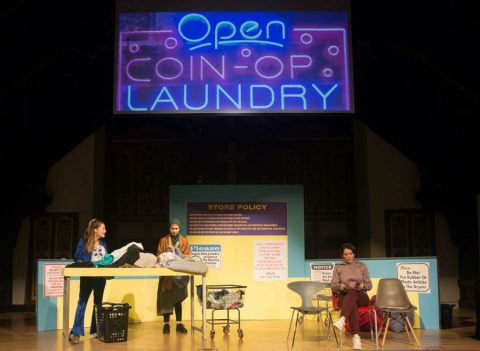
Ivan Faute, Playwright: As a playwright, I’m always looking for [new] spaces to set a good story, and to that end, I was complaining to a friend who’d just moved to Astoria that it was so difficult to find a good setting for a play. He very excitedly suggested I write a play about his corner laundromat, which he described as being full of all different cliques and ripe for drama. Astoria is full of various immigrant groups, which is also a subject that I’ve written about in several other plays and short stories. So, I just ran with it. [Today,] I’m so excited with the cast that Madelyn has assembled, all of whom are excellent actors and bring their own family histories to enrich the story. UP Theater has been a dream to work with as well, in terms of staging a new script.
For the others, what was it about this play that particularly spoke to you? Why was this one “the one” to do?
Kirby Fields, Artistic Director, UP Theater Company: At the height of the pandemic, we put out a call for scripts that had been canceled or indefinitely postponed because of the COVID-19 [pandemic]. We received over 125 scripts, one of which was Lost Sock Laundry. Our reading committee consisted of myself, James Bosley [UP’s Founding Artistic Director], and Ashley O’Neill, our Literary Manager. We all read every script with the charge of narrowing the 125 down to eight. Lost Sock was one of the only plays that we unanimously agreed to include.
That the play appealed to each of us in unique ways is a testament of its strength. Personally, I respond most strongly to stories that feature richly drawn characters who are sympathetic despite their flaws. I also appreciate plays that are inherently theatrical and whose dialogue feels natural. This play met all those criteria.
Madelyn Chapman, Director: My favorite plays bring together people who “shouldn’t” be together. Through difficult circumstances, these three very different women become friends and support each other against all odds. What touches me most about the play is witnessing the everyday heroism of people who stand up for and do the right thing for others.
What about the way the material is presented makes this hot topic of bias/immigration & violence towards other cultures easier to digest?
Murphy: If the play makes these topics easier to digest, then that’s all because of Ivan. He’s put us in an intimate space that feels familiar; even mundane—a neighborhood laundromat in Queens. I also think that when strangers meet face-to-face and must work together, more often than not, we’re disarmed when we realize those strangers are just people. That’s what this play captures so brilliantly.
Chapman: Similarly, this play is a beautiful exploration of the “human side” of what it means to be an immigrant in this country. That, as Micaela observes in the show, people don’t just “have a bad day and [then] they are like, boom, ‘I should move to [America…’cause] It’s so much better there.” Things drive people to immigrate: the lack of financial opportunity, war, oppressive regimes, natural disasters, etc. It’s a very challenging process to get to the US – legally and even more so illegally – and people give up a lot to come here and start a new life.
Why is UP Theater Company the place for this show?
Faute: I discovered UP when they did a reading of this play a few years ago. Since that reading, I’ve been able to see their shows and have conversations with [UP Artistic Director] Kirby [Fields]. I’ve been impressed by their productions and really appreciate how they want to make the high-quality theater that welcomes everyone. They also support new work!
Fields: Like Ivan said, our primary mission is to serve the community of Upper Manhattan with high-quality, thought-provoking, and emotion-inducing new work, [and] this play easily checks all those boxes.
What also compelled me, however, is the idea that while the play is set in a laundromat in Astoria, it could just as easily be outside the 181st Street venue it’s playing in, or across town on Audubon, or up on Sherman Avenue in Inwood. [In short,] the play takes its inspiration from a specific neighborhood, but it could also be your neighborhood, and in that, our hope is that the people of our community recognize their community on the stage.
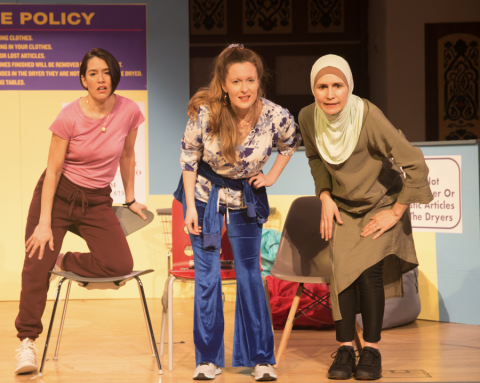
You also have several Spanish-language translation performances within your run and an ASL-interpreted performance as well. What was the decision behind that in terms of promoting inclusivity, especially with a play that deals with cultural differences and assimilation/inclusivity?
Faute: I wish I could take any credit for those performances, but [its genesis] came from UP (laughs). But I will say that because we live in a multilingual nation, I’m very excited to be expanding our audience in this way.
Fields: Obviously, there are a significant number of Upper Manhattan’s residents whose primary language is Spanish, and it has been a longtime goal of the company to reach them more directly. We believe offering Spanish-translation services and free tickets to the people who require them is a big part of our outreach.
Additionally, this play, with its multicultural cast and its exploration of such themes as assimilation vs. adaptation vs. tradition, can speak to these audiences in ways that would resonate with them.
Ivan has said that he writes plays for audiences that do not normally attend the theater. And we believe that these special performances support that goal.
Can you also talk about casting in terms of representation among the MENA community, both as actors and people?
Fields: As an Artistic Director, I value diversity, of course; however, in all honesty, I just as strongly consider how strong the roles are for the actors to play, [asking,] “Are these fully realized characters? Are their cultural backgrounds embedded in who they are? Does the play value the differences among them equally?”
This [concept] extended to the casting. We strove to cast actors in roles that were extensions of how they identify when they are not on the stage. From the first table read, [we] sparked conversation about, say, a regional Spanish dialect or the appropriateness of an Arabic name. Given how integral the theme of identity is in the play, we thought it was of the utmost importance that members of the cast be able to participate in the conversation on this level.
Faute: And to that end, [it’s] been awesome to hear from MENA actors who are excited to play a character that gives them to chance to bring their family history to the role.
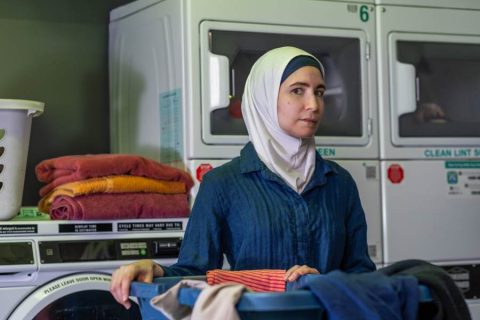
Haneen, how do you relate to Dina’s journey specifically? How has playing Dina helped you to navigate life as a member of the MENA community?
Murphy: For one, not only did Dina leave her home in Lebanon under duress and abandon a comfortable life, but by wearing a hijab, she’s now a visible Muslim woman in a society generally suspicious of Muslims. She’s also suddenly navigating a new language and culture, her daughter is assimilating in a way she doesn’t completely understand, her husband’s status is diminished….I see Dina – and all immigrants, for that matter – as extraordinarily brave. If anything, she reminds me how privileged I am and how important it is to try to help make space for immigrants, both onstage and off. When I have the opportunity to portray an immigrant on stage, I [strive] to represent them in a responsible way.
What is the significance of setting in a laundromat? What does that allow you to do production-wise or story-wise that you couldn’t if the play was set somewhere else?
Chapman: The laundromat, like America, is a place where there are written (in large print all over the place) and unwritten rules. Also, a laundromat, like America, is a place where community is built – especially prescient in terms of this play.
Faute: There are fewer and fewer “third place” environments left, especially those where we interact with strangers – that’s a big part of what drives the story. But laundry is also something that never seems to be finished; there’s always more to be done. America is like that as well: it’s not a place that is finished, but always has more that needs to be done.
Also pertinent is the time period in which the play takes place. What effect does setting it in 2017-2018 have on the story you’re telling, the characters, and the actors themselves? With the 2024 election looming and immigration issues in the news again, why is it important to see then vs. now? And do you see a difference, if at all?
Faute: I started the first notes for the play in 2017, which is one reason it’s set then. My naïve hope was that this play would be too historical to ever be produced, but, of course, immigration issues get used during election years to provoke people. As I developed the play, historical events around DACA and immigration law started to touch on the character’s lives….It’s startling how some of the lines and character reactions speak to 2024 in ways that I could never have even predicted.
Chapman: The similarity lies in the issue of immigration – where groups are being pitted against each other and there are legal setbacks for people trying to immigrate to (or remain in) this country. It makes for great material, but at its heart, it’s quite tragic.
Similarly, given that these are such prevalent topics in the piece, and in the characters’ daily lives and conversations, what does it say about people in the world today?
Faute: Like one of the characters in the play says, [you] hope that America lives up to its promises. People are not going to stop moving from place to place, but I hope that we can find ways to treat people with dignity, “hope” being the operative word.
Murphy: Even if we take one step back for every two steps forward toward empathy and acceptance, that’s still progress. And we have to be hopeful about the future. If we lose hope in the world and in ourselves, I don’t know how humans could continue to operate. That said, it’s not so easy [to do] right now. I think that Ivan’s written a very hopeful play. I would like to think that our audiences leave feeling optimistic and empathetic, and [carry] those feelings out into the world. Every nudge helps.
At the same time, as things seemingly get worse within the world of the play, the relationships among characters start to deepen and grow for the better. What does it say about human relationships in times of turmoil?
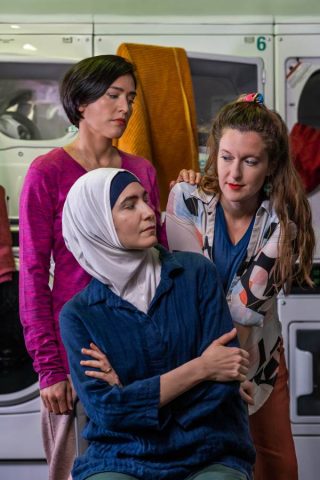
Faute: The people in the play become closer and grow because they are in relationship with each other. They all have a desire to understand the other person and build these relationships, even if they can’t always understand or agree. Because they know that they are cared for by others, it allows them to pass along that care and kindness.
Murphy: Similarly, I think that [statement] speaks to the idea of empathy. The more we see others in need, the more we want to help them, whomever they are. Or… so I would hope.
Why, in your opinion, is it important that these types of stories be told? Why now? Especially in terms of religious differences, why is it important that these issues permeate theatrical works? What does theatre do differently to get its point across?
Faute: Theater allows people to experience stories very immediately and deeply, but also with a veil of safety.
Murphy: I think part of Ivan’s point with the play is that it’s okay to ask questions when you don’t know or understand something. The women get to know each other by asking questions; sometimes uncomfortable ones. In the real world, of course, we all have questions about religion, sex, or cultural differences… but even when we have the opportunity to ask someone with [said] experience, we’re often too shy to [do so]. Having some of those questions being asked live in front of you [during the show] and seeing what the unexpected answer is, might be as close to real life as it gets.
Fields: I think that the answer to that question actually lies in the venue in which this play is being performed. The Fort Washington Collegiate Campus houses Christian services in the sanctuary on Sundays and Jewish services on Friday nights and Saturday mornings in the fellowship hall. This is a play about, among other things, respecting religious differences, and it is being performed in an interfaith venue!
As far as why the theater is the preferred setting for these kinds of matters? The live dialogue-driven nature of the genre can more easily foster conversation more than, say, the solitary action of reading or the static gloss of a film. There is something about the immediacy of live performance that lends itself to conversations such as those that plays like Lost Sock Laundry inspire.
Finally, what do you hope to instill in audiences as they come away from this play?
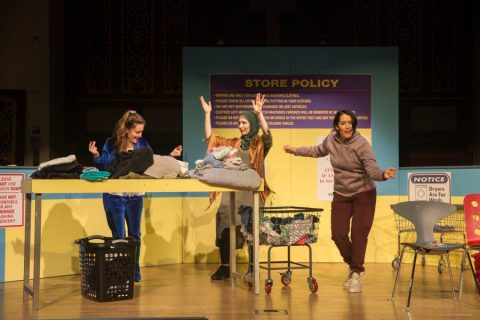
Yasmin Ranz-Lind, Sana: Our lives are enriched by exposure to people with different [backgrounds] and experiences than us. It makes us more empathetic, and, just seeing the way these three women interact with each other, [I can say] people who are different from you can make you better and make your life more fulfilling.
Murphy: Dina has had a hard life, but she’s also not a saint. As you come to find out in the play, Irene and Micaela aren’t saints either. But no one—immigrants included—should need to be saints to be given the benefit of the doubt and an opportunity to find their way.
Fields: Mainly, I want this play to make audience members consider the people behind the headlines who will likely intensify in vitriol as we get closer to November, whether those headlines apply to the Southern border or the new arrivals here in NYC. I also want them to consider seeing more performances from UP Theater!
Chapman: I always hope a play will spark new and possibly difficult conversations among the people who come.
Faute: I hope that everyone, no matter what they believe about the politics of immigration, sees something of themselves in one of the characters. I also hope, given that the subject matter of this play might be touchy for some people, that it creates space for people to talk about it openly with their old friends and maybe even new friends. [And to know], again, that it’s okay to have conversations about immigration, it’s okay to talk to each other, it’s okay to ask questions… and [feel] that those questions aren’t agenda-driven or aren’t aggressive…..By engaging in conversations that make us uncomfortable to a point, we’re expanding our understanding of the world [and] of ourselves.
Lost Sock Laundry is playing at Fort Washington Collegiate Church (729 W. 181st Street) through April 27th. Spanish-translated performances on April 17 at 8pm, April 20 at 8pm, and April 27 at 3pm are all free of charge at the door on the day of the performance; there is also an ASL-translated performance on April 25 at 8pm. For tickets and/or more information, visit uptheater.org.